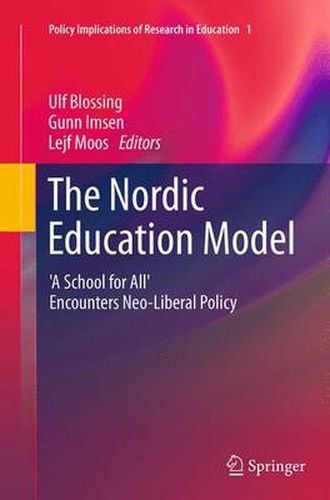Readings Newsletter
Become a Readings Member to make your shopping experience even easier.
Sign in or sign up for free!
You’re not far away from qualifying for FREE standard shipping within Australia
You’ve qualified for FREE standard shipping within Australia
The cart is loading…






This title is printed to order. This book may have been self-published. If so, we cannot guarantee the quality of the content. In the main most books will have gone through the editing process however some may not. We therefore suggest that you be aware of this before ordering this book. If in doubt check either the author or publisher’s details as we are unable to accept any returns unless they are faulty. Please contact us if you have any questions.
This book presents a detailed analysis of the educational model in Nordic European countries. It describes the traditional idea of education for all, which can be characterized by the right for every child to have an education of equal quality in a common school for all pupils regardless of social class, abilities, gender, or ethnicity.
Against this background, The Nordic Education Model traces the rise of neo-liberal policies that have been enacted by those who believe the School for All ideology does not produce the knowledge and skills that students need to succeed in an increasingly competitive and global marketplace. It examines the conflict between these two ideas and shows how neo-liberal technologies affect the Nordic model in different ways.
The authors also show how social technologies are being interpreted in different ways in actual school practices. This process of translating national regulations into internal sense builds on the values in the culture to which they are introduced.
In the end, this book reveals that a Nordic model can constitute a delicate balance between traditional values, institutionalized practices, and contemporary, neo-liberal forms of governance and policies. It may be argued from a new institutional perspective that the main structures of the Nordic educational model will sustain as long as the deeply rooted Nordic culture survives in the globalised society.
$9.00 standard shipping within Australia
FREE standard shipping within Australia for orders over $100.00
Express & International shipping calculated at checkout
This title is printed to order. This book may have been self-published. If so, we cannot guarantee the quality of the content. In the main most books will have gone through the editing process however some may not. We therefore suggest that you be aware of this before ordering this book. If in doubt check either the author or publisher’s details as we are unable to accept any returns unless they are faulty. Please contact us if you have any questions.
This book presents a detailed analysis of the educational model in Nordic European countries. It describes the traditional idea of education for all, which can be characterized by the right for every child to have an education of equal quality in a common school for all pupils regardless of social class, abilities, gender, or ethnicity.
Against this background, The Nordic Education Model traces the rise of neo-liberal policies that have been enacted by those who believe the School for All ideology does not produce the knowledge and skills that students need to succeed in an increasingly competitive and global marketplace. It examines the conflict between these two ideas and shows how neo-liberal technologies affect the Nordic model in different ways.
The authors also show how social technologies are being interpreted in different ways in actual school practices. This process of translating national regulations into internal sense builds on the values in the culture to which they are introduced.
In the end, this book reveals that a Nordic model can constitute a delicate balance between traditional values, institutionalized practices, and contemporary, neo-liberal forms of governance and policies. It may be argued from a new institutional perspective that the main structures of the Nordic educational model will sustain as long as the deeply rooted Nordic culture survives in the globalised society.